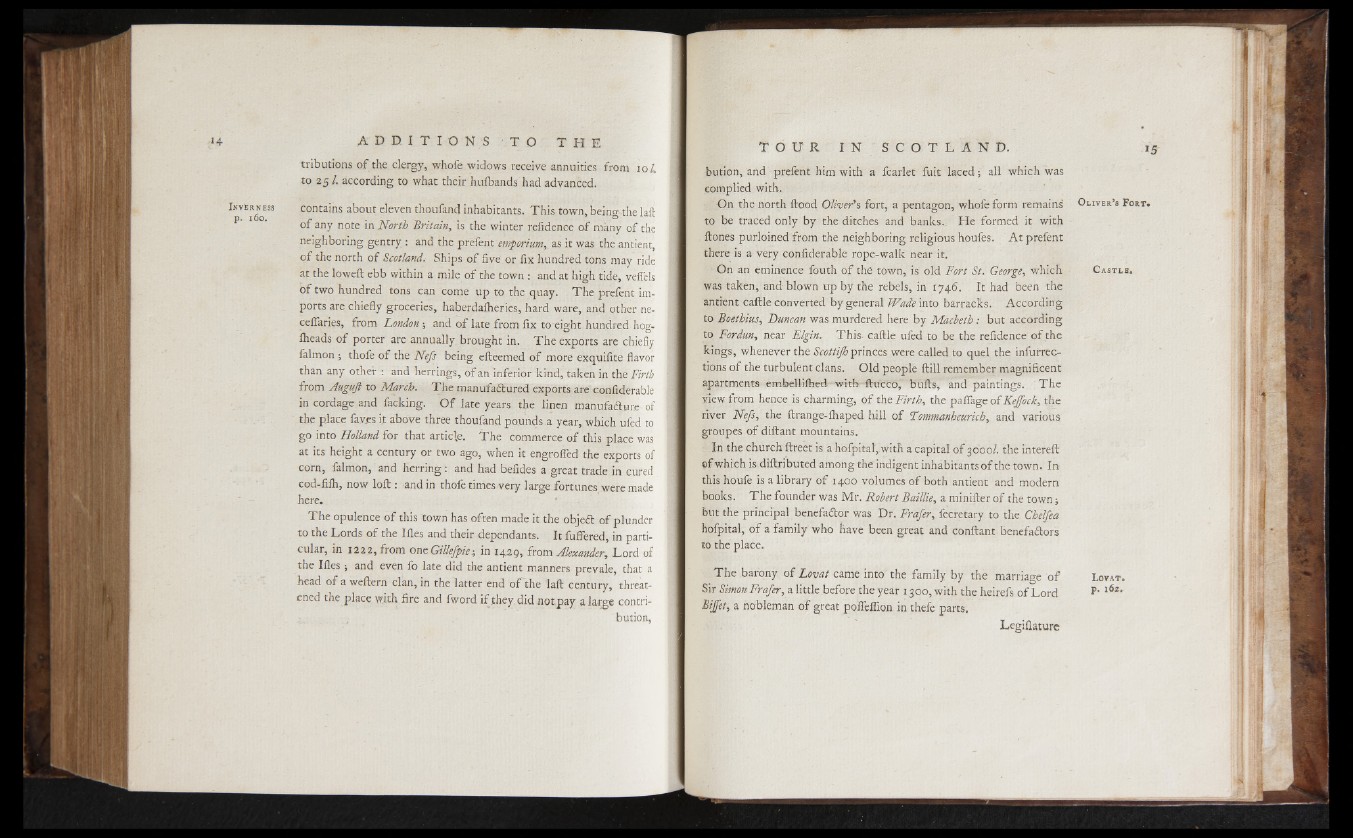
Invernes s
p. 160.
tributions of the clergy, whofe widows receive annuities from 10 /„
to 25 /. according to what their hufbands had advanced.
contains about eleven thoufand inhabitants. This town, beino- the laft
of any note in North Britain, is the winter refidence of many of the
neighboring gentry : and the prefent emporium, as it was the antient,
of the north of Scotland. Ships of five or fix hundred tons may ride
at the lowed: ebb within a mile of the town : and at high tide, vefiels
of two hundred tons can come up to the quay. The prefent imports
are chiefly groceries, haberdalheries, hard ware, and other ne-
ceflaries, from London-, and of late from fix to eight hundred host-
lheads of porter are annually brought in. The exports are chiefly
falmon ; thofe of the Nefs being efteemed of more exquifite flavor
than any other : and herrings, of an inferior kind, taken in the Firth
from Auguft to March. The manufactured exports are confiderable
in cordage and facking. Of late years the linen manufacture of
the place faves i.t above three thoufand pounds .a year, which .ufed to
go into Holland for that article. The commerce of this place was
at its height a century or two ago, when it engrafted the exports of
corn, falmon, and herring: and had befides a great trade in cured
cod-filh, now loft: and in thofe times very large fortunes, were made
here.
The opulence of this town has often made it the objedt of plunder
to the Lords of the Ifles and their dependants. It fuifered, in particular,
in 1222, from one Gillefpie; in 1429, from Alexander, Lord of
the Ifles ; and even fo late did the antient manners prevale, that a
head of a weftern clan, in the latter end ofthe laft century, threatened
the place with fire and fword if they, did not pay a large contribution,
bution, and prefent him with a fcarlet fuit laced; all which was
complied with.
On the north flood Oliver's fort, a pentagon, whofe form remains'
to be traced only by the ditches and banks.. He formed it with
ftones purloined from the neighboring religious houfes. At prefent
there is a very confiderable rope-walk near it.
On an eminence fouth of thé town, is old Fort St. George, which
was taken, and blown up by the rebels, in 1746. It had been the
antient caftle converted by general Wade into barracks. According
to Boethius, Duncan was murdered here by Macbeth : but according
to Fordun, near Elgin. This caftle ufed to be the refidence of the
kings, whenever the Scottiß princes were called to quel the infurrec-
tions of the turbulent clans. Old people ftill remember magnificent
apartments embellifhed with ilucco, bulls, and paintings. The
view from hence is charming, of the Firth, the pafiage of Kejfock, the
river Nefs, the ftrange-fhaped hill of Fommanheurich, and various
groupes of diftant mountains.
In the church ftreet is a hofpital,with a capital of 3000/. the intereft
of which is diftributed among theindigent inhabitants of the town. In
this houfe is a library of 1400 volumes of both antient and modern
books. The founder was Mr. Robert Baillie, a minifter of the town ;
but the principal benefadtor was Dr. Frafer, fecretary to the. Chelfea
hofpital, of a family who have been great and confiant benefadtors
to the place.
The barony of Lovat came into the family by the marriage of
Sir Simon Frafer, a little before the year 1300, with the heirefs of Lord
Bijfet, a nobleman of great pofTeffion in thefe parts.
Legiflature